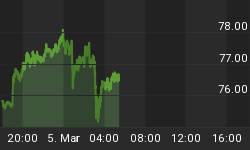It's been obvious for some time that America's trading partners are caught in a financial catch-22: If China, Japan, and Saudi Arabia keep accepting dollars in return for their cars, toys and oil, their currency portfolios become even more unbalanced and their foreign exchange risks more extreme. But if they sell some of their dollars, everyone else will feel free to do the same, and the the value of their remaining dollars might plunge.
So most big holders of dollars are diversifying while pretending not to. China, for instance, continues to accumulate Treasuries -- but only short-term notes, not long-term bonds -- while buying up real assets like oil fields and iron ore mines. Once sufficiently diversified, so the thinking goes, it can start trading commodities like oil in other currencies.
Dollar-bulls assume this second stage is a long way off. But maybe not. According to an article by the Independent's Robert Fisk (excerpted below), the process now has a timeline:
The demise of the dollar
By Robert FiskIn the most profound financial change in recent Middle East history, Gulf Arabs are planning - along with China, Russia, Japan and France - to end dollar dealings for oil, moving instead to a basket of currencies including the Japanese yen and Chinese yuan, the euro, gold and a new, unified currency planned for nations in the Gulf Co-operation Council, including Saudi Arabia, Abu Dhabi, Kuwait and Qatar.
Secret meetings have already been held by finance ministers and central bank governors in Russia, China, Japan and Brazil to work on the scheme, which will mean that oil will no longer be priced in dollars.
The plans, confirmed to The Independent by both Gulf Arab and Chinese banking sources in Hong Kong, may help to explain the sudden rise in gold prices, but it also augurs an extraordinary transition from dollar markets within nine years.
The Americans, who are aware the meetings have taken place - although they have not discovered the details - are sure to fight this international cabal which will include hitherto loyal allies Japan and the Gulf Arabs. Against the background to these currency meetings, Sun Bigan, China's former special envoy to the Middle East, has warned there is a risk of deepening divisions between China and the US over influence and oil in the Middle East. "Bilateral quarrels and clashes are unavoidable," he told the Asia and Africa Review. "We cannot lower vigilance against hostility in the Middle East over energy interests and security."
China imports 60 per cent of its oil, much of it from the Middle East and Russia. The Chinese have oil production concessions in Iraq - blocked by the US until this year - and since 2008 have held an $8bn agreement with Iran to develop refining capacity and gas resources. China has oil deals in Sudan (where it has substituted for US interests) and has been negotiating for oil concessions with Libya, where all such contracts are joint ventures.
Furthermore, Chinese exports to the region now account for no fewer than 10 per cent of the imports of every country in the Middle East, including a huge range of products from cars to weapon systems, food, clothes, even dolls. In a clear sign of China's growing financial muscle, the president of the European Central Bank, Jean-Claude Trichet, yesterday pleaded with Beijing to let the yuan appreciate against a sliding dollar and, by extension, loosen China's reliance on US monetary policy, to help rebalance the world economy and ease upward pressure on the euro.
Ever since the Bretton Woods agreements - the accords after the Second World War which bequeathed the architecture for the modern international financial system - America's trading partners have been left to cope with the impact of Washington's control and, in more recent years, the hegemony of the dollar as the dominant global reserve currency.
The Chinese believe, for example, that the Americans persuaded Britain to stay out of the euro in order to prevent an earlier move away from the dollar. But Chinese banking sources say their discussions have gone too far to be blocked now. "The Russians will eventually bring in the rouble to the basket of currencies," a prominent Hong Kong broker told The Independent. "The Brits are stuck in the middle and will come into the euro. They have no choice because they won't be able to use the US dollar."
Chinese financial sources believe President Barack Obama is too busy fixing the US economy to concentrate on the extraordinary implications of the transition from the dollar in nine years' time. The current deadline for the currency transition is 2018.
"These plans will change the face of international financial transactions," one Chinese banker said. "America and Britain must be very worried. You will know how worried by the thunder of denials this news will generate."
BUY OFFSHORE GOLD AND SILVER WITH GOLDMONEY















